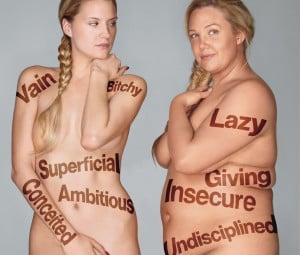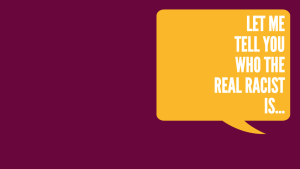Originally published on Medium and republished here with the author’s permission.

Family having a meal together.
All across America, people are wondering what to do to stop the rising tide of fascism and many feel powerless and frustrated.
I posted on social media that white people need to do more and specifically to reach those white men marching with torches, chanting Nazi slogans.
They are our family members, attend our churches, work and eat with us every day.
Reasonably so, many folks responded in frustration, saying, “I just don’t know what to do.” White people are not accustomed to taking responsibility for white supremacy.
For too long, the “good liberal” response has been to distance oneself from racism. We ended up with huge groups of white people fomenting both overt and latent racism who simply didn’t talk about it if there was a chance someone would disagree. In our last presidential election, those people elected a leader who is encouraging them into the open.
Those white men marching with torches are our family members, attend our churches, work and eat with us every day.
In some ways, openly expressed racism is an opportunity for change; clearly, it is more dangerous to more people.
We need to meet the challenges with which we’ve been presented to radically shift a nation in need of healing.
And yet, each of us has but one small life, our daily words, and actions. This doesn’t make us unequal to the task, however. Remember, every bit of human culture was created by humans. This is what we’re born for and good at. We are culture makers.
My suggestion is to do things that make sense for your interests and personality.
You don’t have to become someone you’re not, but don’t disengage. Don’t just unfriend people on social media because they’re racist and think you’ve done anything but make yourself more comfortable.
Uncle John at the picnic and the Deacon at your church and that kid you supervise at work are the people whom you can influence — though maybe not as profoundly or immediately as you’d like. They are your community; we have a social responsibility to one another — and to the broader suffering our continued complicity in racism creates.
You don’t have to become someone you’re not, but don’t just disengage.
It’s overly simplistic to keep telling people to “speak up more often” and “put some skin in the game” though that’s how these suggestions boil down. Is it scary and potentially dangerous? Yes, sometimes.
Let’s not forget that fuller participation in one’s community, family, and social issues also form a path to a richer, more meaningful life. It’s what most of us crave, though we’re afraid. Mostly, action is the antidote for fear.
It’s not likely you will reach others by ranting on (in person or on social media) about how wrong they are in their beliefs. It will take your honest and visible engagement with your own life of privilege and commitment to social justice.
So, here are six specific suggestions. It’s just a start.
1. Learn about the actual circumstances of people of color in the U.S. and then talk about what you’ve learned.
Listen to people of color discussing their real life experiences with schooling, with police, with job interviews, with traveling across the country, applying for a loan, etc. And when I say “listen” I don’t mean that you should ask individual people of color to educate you.
Read up on sites like Colorlines, Black Girl Dangerous, Son of Baldwin, etc. These are sources that offer not just commentaries on racism, but people of color writing about their own life experiences.
In everyday conversations, disrupt the ideas that a lot of opinion-media perpetuates. For instance, if you hear someone talking about how people of color can have a free college education because of affirmative action, there are ways to enter into that conversation with facts.
The rate of college attendance in the U.S. by people of color is a knowable fact. You are likely carrying a powerful computer in your pocket. Pull out your phone and look up the percentage of African American or Latino attendance at your largest local university campus and discuss what you find.
Read out a basic definition of “affirmative action” from Wikipedia and have a discussion. Use a search term like “challenges to affirmative action” and see what’s interesting.
Every time a topic emerges, learn, use real data to disrupt false perceptions, discuss.
2. Integrate your everyday experiences.
Understand that the profound racial segregation of everyday life in the U.S. keeps you from being able to easily understand those whose experiences differ from your own.
You have to consciously do something to integrate your experiences. Schooling and housing are the two biggest ways that we come to believe that segregation is normal and that we understand social life when really, most see only people with experiences similar to their own.
The vast majority of U.S. schools are either less than 10% white students, or less than 10% students of color. (Read Jonathan Kozol and Lani Guiner, as examples, about apartheid schooling and the myth of meritocracy in the U.S.)
And because schooling and housing most often follow economic lines, it’s even more likely that the people of color that white folks meet in their schools and neighborhoods have either learned not to discuss their experiences with race or seem to have more in common across racial lines because of income.
You can make an effort to integrate more of your everyday experiences. Sometimes make a point to eat and mingle and participate and pursue your interests outside of your racial (and ideally, economic) group. You can expand your own life without being a burden on others.
That is, you’re not in the Ethiopian restaurant to interview people about their exotic experiences. You’re there to enjoy the food and pay attention to what’s offered to you as a participant.
Go to music events, attend a poetry slam. Find an integrated school — or at least camp or enrichment classes — for your kids (it’s hard, but possible). If you don’t know any immigrants from non-European countries, make an effort. Find out what you’re missing.
You can expand your own life without being a burden on others.
Racial isolation is everyone’s enemy on an everyday level.
Also, understand that there are times when people of color don’t want the burden or stress of white folks around, so use discernment and sensitivity in your efforts. Sit in productive discomfort and find pleasure in new experiences.
3. Learn some conflict management and facilitation skills.
“Speak up” doesn’t mean “just say anything.”
Sometimes saying something to Uncle John at the family picnic is totally scary and you may just manage an emotional outburst like the one he’s having. That’s okay once or twice; people will see you honestly grappling with painful topics. Then it’s time to grow; it’s possible to do better.
I have been teaching workshops in conflict resolution, bystander facilitation, and linguistic reframing for years at local mediation centers and varied community locations. You can find these classes in your area too. Start with a mediation center, or just start with the internet and search “workshops on” any topic related to communication or activism that interests you.
Build your skills. Most of these classes are brief, low or no costs and include an element of practice and community.
4. Educate yourself about the history of racism in your nation and share what you’ve learned.
All over the world, nations begun by white colonialism have been trying to find ways to understand and make peace with our histories. The U.S. is a nation begun by white colonialism — white people from another continent came to North America to murder and take from others, and then they began trafficking people from other continents to further increase their wealth.
If that’s not how you heard it, or you think this has no impact on our current problems with racism, you have been misled and you can fix that. The U.S. has done a particularly poor job at owning and fixing its history of racial oppression.
So, how do you intervene with your one small life? Start by learning about the racial history of things that interest you.
If you’re religious, learn about your faith community’s history in either supporting or fighting against slavery and immigrant abuses, for instance. If you sew, learn about the history of quilt-making in the U.S. and how stories have been carried down through women’s handiwork in different racial communities. If you’re a musician, learn about the racial history of your instrument, or type of music.
Literally every part of our daily lives can be understood through the experience of race.
Talk about what you’ve learned. Listen and participate.
Literally every part of our daily lives can be understood through the experience of race.
5. Discuss the relationships between economic opportunities and racism.
Understand that many poor and middle-class white men in the U.S. feel oppressed because their opportunities have been shrinking for decades.
What’s hard for many to see is that they still have it better than everyone else — everyone except rich white men.
The upper class is shrinking in numbers and growing in power and it’s in their best interest for people at the bottom of the economic heap to continue hating each other while believing that hard work brings advancement. This link between race and economics is not new.
The whole construction of race as a concept of interest grew in the United States as an economic tactic to divide poor people against each other to avoid uprising against those at the top.
Some people learn that they should be content having a bit more opportunity and respect while others learn that they will never improve their lot because of moral and intellectual failings. That’s a recipe for maintaining social imbalance that never disturbs the upper class.
This is what we come from, and in current times, we’ve also been sold the belief that individual action is what causes social mobility when there is little evidence of this, except in the most heroic cases. Having these discussions helps contextualize our ongoing national problems with
Having these discussions helps contextualize our ongoing national problems with racism while refocusing people on creating the kind of local and national economic policies that can help lift everyone’s standard of living.
6. Stay aware of how oppressions are all interconnected, and learn to focus in on one thing at a time when needed.
Most of us just don’t have much skill or practice with ambiguity and paradox. Much of our everyday lives and media prompt us to think in dichotomies: good or bad, left or right, black and white. This thinking starts to seem normal when, really, it’s just habitual.
We have to handle the reality that each of us is privileged and each of us is oppressed at different times and in different measures.
Rather than focusing only our own misfortunes, it’s possible to work for the liberation of all and include ourselves in that positive outcome. Working to end racism and the systems that support it will help anyone who is oppressed because we are helping to reveal the lines through which power runs.
Race, gender, age and all forms of identity and appearance privilege are like a tapestry. Pull one thread and the whole picture changes. No one form of oppression can be addressed as the lynchpin to change all the others.
We must bring the wisdom we have about racism into the struggle to address sexism; bring the experiences we have with homophobia into the struggle to address immigrant oppression, and so on.
Hold the big picture, while doing the small thing. Every day.
It’s possible to work for the liberation of all and include ourselves in that positive outcome.
Writer and educator, Parker Palmer, talks about living and working “in the tragic gap.”
It’s the place where we keep working toward the better world we may never fully see. It’s how we give in to neither “corrosive cynicism” or “irrelevant idealism.” As he says, both of these will take us out of the action of human community. In the first case, we stop trying because things seem futile. In the second, we never do enough because our efforts aren’t worthy.
Hold onto the big picture and think about what you can do today, in relationship to the people you know and see all the time. Practice and fail and discuss. Choose to either win the battle or learn the lesson.
We only fail as individuals when we turn away from eachother, when we act like we can do nothing to remedy suffering, to remedy wrongdoing.
[do_widget id=’text-101′]
Kimberly Dark is a writer, sociologist and raconteur working to reveal the hidden architecture of everyday life, one clever story, poem and essay at a time. Learn more at www.kimberlydark.com
Search our 3000+ articles!
Read our articles about:
Our online racial justice training
Used by hundreds of universities, non-profits, and businesses.
Click to learn more




















